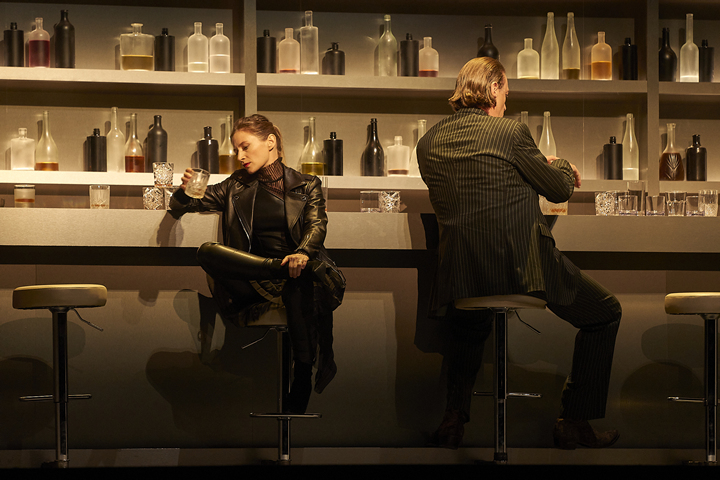| Opera Reviews | 3 May 2024 |
Simply memorable!by Moore Parker |
|
Mozart: Le nozze di Figaro |
|
 |
|
|
Martin Kušej’s 2023 concept propels Mozart’s masterpiece into a contemporary world of Mafiosi, violence and drugs with the Count running the show, and with his right hand man, Basilio, posing as a scandal-hungry priest whose guitar case serves to conceal his machine gun. Trigger-happy, Almaviva is quick to draw his firearms be it in the jealous fury of Act 2, or to almost polish-off his “adversaries” in the opera’s closing scene. Set in an hotel or perhaps a luxurious spa, horizontal sliding units of varying sizes convert from a bar to a grand bathroom, an underground garage, to an overgrown garden, and so on, with amazing dexterity - and with only a couple of occasions requiring creativity from the forte piano in the pit as a filler (with set designs by Raimund Orfeo Voigt). The whole affair is somehow rather tongue-in-cheek, but ultimately rather entertaining through its many imaginative ideas - such as the highly-amusing and quirky Marcellina/Susanna Act 1 encounter which takes place in the bar’s Ladies Room. All the characters are crisply formed and fully credible, with the direction respectfully allowing them, Mozart’s score, and indeed the audience, appropriate space in which to “breathe”. As one celebrated reviewer said in the 1970’s of Montserrat Caballé, “She knows how to take time!” Friedrich Rom is responsible for the particularly effective lighting, which is never intrusive and at times ideally dramatic, with abrupt changes propelling one scene to the next. In the title role, Krzysztof Bączyk brought a sonorous - yet appropriately youthful bass - voice with a towering figure and easy stage manner to the role. His Susanna, Sabine Devieilhe is too a stage natural, impish and of slight figure - but also of very slight tone which at times was borderline for the task to hand. In all, however, a nice showing with a well-poised “Deh vieni, non tardar” to win the day. Cherubino provided a fair dose of insolent humour, physically coming across as a very young pubescent boy whose vocal development hadn’t quite followed the progress of his reproductive hormones. Modest in timbre, Lea Desandre’s “Non so più..” rather came and went, but the French-Italian singer captured the moment through her fine artistry in the opera’s party piece “Voi che sapete..” and scored a deserved hit as a strong contributor to the evening. Andrè Schuen’s Count was finely sung, and ideally cast with his good looks and physical appeal well-matching the evening’s concept. Kušej indeed really plays on the lust and potential promiscuity of the leading protagonists - with any and all available for a little fun, at any opportunity. It’s rather a wonder that he didn’t introduce any LGBT+ options to the plot. As his spouse, Adriana González is blessed with a rich, rounded soprano capable of finely-controlled dynamic variation and projection, which she utilised to magical effect in her two grand arias. Barbarina was luxuriously cast with Serafina Starke hinting at an ideal future Susanna, and an undoubted bright future in the wings. Manuel Günther was a particularly strong Basilio, while Peter Kálmán (Bartolo), Andrew Morstein (Don Curzio) and Rafal Pawnuk (Antonio) all wonderfully augmented the characterful cast. From the first few phrases of the overture it was evident that an evening of superlative playing was in store, with Raphaël Pichon’s captivating reading revealing the subtlest of variation and expression (often within a single bar) evidently cerebral, yet with a sense of fresh spontaneity, while driving the Wiener Philharmoniker to give of their absolute best.
|
|







